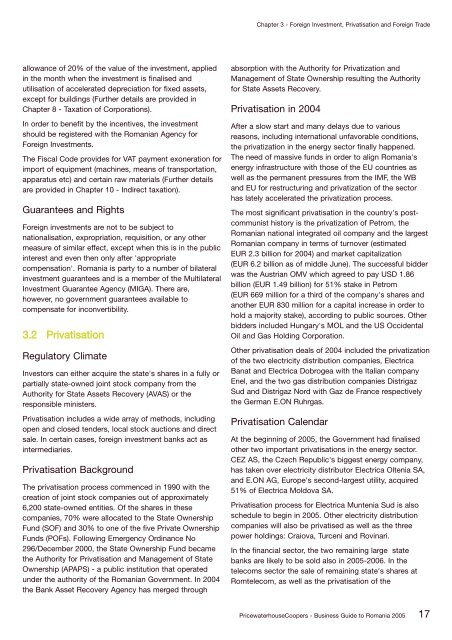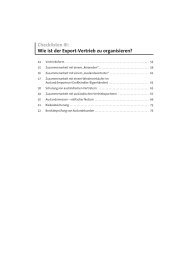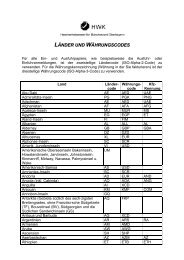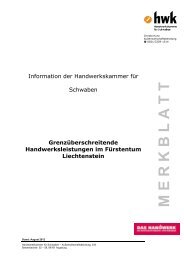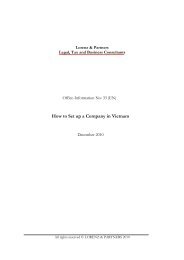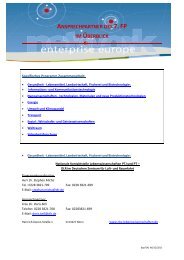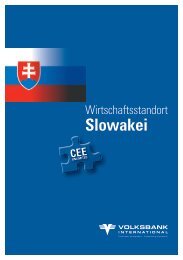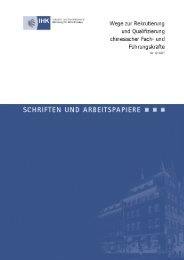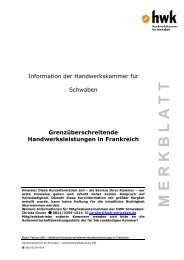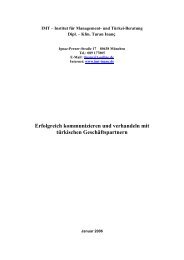Business Guide to Romania* - Bayern - Europa
Business Guide to Romania* - Bayern - Europa
Business Guide to Romania* - Bayern - Europa
Create successful ePaper yourself
Turn your PDF publications into a flip-book with our unique Google optimized e-Paper software.
allowance of 20% of the value of the investment, applied<br />
in the month when the investment is finalised and<br />
utilisation of accelerated depreciation for fixed assets,<br />
except for buildings (Further details are provided in<br />
Chapter 8 - Taxation of Corporations).<br />
In order <strong>to</strong> benefit by the incentives, the investment<br />
should be registered with the Romanian Agency for<br />
Foreign Investments.<br />
The Fiscal Code provides for VAT payment exoneration for<br />
import of equipment (machines, means of transportation,<br />
apparatus etc) and certain raw materials (Further details<br />
are provided in Chapter 10 - Indirect taxation).<br />
Guarantees and Rights<br />
Foreign investments are not <strong>to</strong> be subject <strong>to</strong><br />
nationalisation, expropriation, requisition, or any other<br />
measure of similar effect, except when this is in the public<br />
interest and even then only after 'appropriate<br />
compensation'. Romania is party <strong>to</strong> a number of bilateral<br />
investment guarantees and is a member of the Multilateral<br />
Investment Guarantee Agency (MIGA). There are,<br />
however, no government guarantees available <strong>to</strong><br />
compensate for inconvertibility.<br />
3.2 Privatisation<br />
Regula<strong>to</strong>ry Climate<br />
Inves<strong>to</strong>rs can either acquire the state's shares in a fully or<br />
partially state-owned joint s<strong>to</strong>ck company from the<br />
Authority for State Assets Recovery (AVAS) or the<br />
responsible ministers.<br />
Privatisation includes a wide array of methods, including<br />
open and closed tenders, local s<strong>to</strong>ck auctions and direct<br />
sale. In certain cases, foreign investment banks act as<br />
intermediaries.<br />
Privatisation Background<br />
The privatisation process commenced in 1990 with the<br />
creation of joint s<strong>to</strong>ck companies out of approximately<br />
6,200 state-owned entities. Of the shares in these<br />
companies, 70% were allocated <strong>to</strong> the State Ownership<br />
Fund (SOF) and 30% <strong>to</strong> one of the five Private Ownership<br />
Funds (POFs). Following Emergency Ordinance No<br />
296/December 2000, the State Ownership Fund became<br />
the Authority for Privatisation and Management of State<br />
Ownership (APAPS) - a public institution that operated<br />
under the authority of the Romanian Government. In 2004<br />
the Bank Asset Recovery Agency has merged through<br />
Chapter 3 - Foreign Investment, Privatisation and Foreign Trade<br />
absorption with the Authority for Privatization and<br />
Management of State Ownership resulting the Authority<br />
for State Assets Recovery.<br />
Privatisation in 2004<br />
After a slow start and many delays due <strong>to</strong> various<br />
reasons, including international unfavorable conditions,<br />
the privatization in the energy sec<strong>to</strong>r finally happened.<br />
The need of massive funds in order <strong>to</strong> align Romania's<br />
energy infrastructure with those of the EU countries as<br />
well as the permanent pressures from the IMF, the WB<br />
and EU for restructuring and privatization of the sec<strong>to</strong>r<br />
has lately accelerated the privatization process.<br />
The most significant privatisation in the country's postcommunist<br />
his<strong>to</strong>ry is the privatization of Petrom, the<br />
Romanian national integrated oil company and the largest<br />
Romanian company in terms of turnover (estimated<br />
EUR 2.3 billion for 2004) and market capitalization<br />
(EUR 6.2 billion as of middle June). The successful bidder<br />
was the Austrian OMV which agreed <strong>to</strong> pay USD 1.86<br />
billion (EUR 1.49 billion) for 51% stake in Petrom<br />
(EUR 669 million for a third of the company's shares and<br />
another EUR 830 million for a capital increase in order <strong>to</strong><br />
hold a majority stake), according <strong>to</strong> public sources. Other<br />
bidders included Hungary's MOL and the US Occidental<br />
Oil and Gas Holding Corporation.<br />
Other privatisation deals of 2004 included the privatization<br />
of the two electricity distribution companies, Electrica<br />
Banat and Electrica Dobrogea with the Italian company<br />
Enel, and the two gas distribution companies Distrigaz<br />
Sud and Distrigaz Nord with Gaz de France respectively<br />
the German E.ON Ruhrgas.<br />
Privatisation Calendar<br />
At the beginning of 2005, the Government had finalised<br />
other two important privatisations in the energy sec<strong>to</strong>r.<br />
CEZ AS, the Czech Republic's biggest energy company,<br />
has taken over electricity distribu<strong>to</strong>r Electrica Oltenia SA,<br />
and E.ON AG, Europe's second-largest utility, acquired<br />
51% of Electrica Moldova SA.<br />
Privatisation process for Electrica Muntenia Sud is also<br />
schedule <strong>to</strong> begin in 2005. Other electricity distribution<br />
companies will also be privatised as well as the three<br />
power holdings: Craiova, Turceni and Rovinari.<br />
In the financial sec<strong>to</strong>r, the two remaining large state<br />
banks are likely <strong>to</strong> be sold also in 2005-2006. In the<br />
telecoms sec<strong>to</strong>r the sale of remaining state's shares at<br />
Romtelecom, as well as the privatisation of the<br />
PricewaterhouseCoopers - <strong>Business</strong> <strong>Guide</strong> <strong>to</strong> Romania 2005 17


